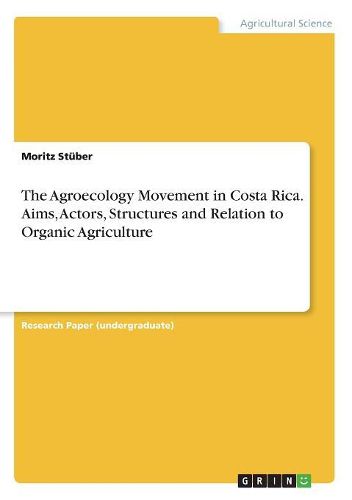Readings Newsletter
Become a Readings Member to make your shopping experience even easier.
Sign in or sign up for free!
You’re not far away from qualifying for FREE standard shipping within Australia
You’ve qualified for FREE standard shipping within Australia
The cart is loading…






Research Paper (undergraduate) from the year 2018 in the subject Agrarian Studies, grade: 2,3, University of Hohenheim (Zentrum OEkologischer Landbau Universitaet Hohenheim), language: English, abstract: Agroecology, just like Organic Agriculture in Europe, belongs to the huge amount of approaches, which aim to perform agriculture in a more sustainable way. The Agroecology movement, as it is named by the famous agronomist and agroecological expert Altieri, has its origins in Latin America. The approach of Agroecology is integrating ecological measures and traditional knowledge into the farming system, aiming to perform agriculture in a more sustainable and also to attain food sovereignty and food security. Regarding to the sheer size of Latin America, several regions are subdivided by having their own sub-movement. By focussing on Costa Rica as part of Central America, this case study aims to give a proper understanding how the Central American movement works. The sub-movement in Central America is called the farmer-to-farmer movement. Here, knowledge and technology are passed on between several farmers within one region, seeing themselves as peer. Trainers, so called promotors are installed, are doing the preparatory work, as they are the link between knowledge and the soon-to-be Agroecological farmers. Workshops are held, and a pre-structuring is given, to enable and simplify the application of Agroecology. CAC can be rather seen as a key methodology, having its origins in Central America. For the Agroecological farmers, the CAC approach is not to be categorised nowhere near Agroecology. CAC is just a method, whereas the farmers are practicing Agroecology as a philosophy. Their philosophy is including culture, traditional practices and community living, together with exchange and political advocacy. Public instruments and structures are not given solely for Agroecology, but for several sustainable agriculture approaches together. A law on Organic Agriculture was imp
$9.00 standard shipping within Australia
FREE standard shipping within Australia for orders over $100.00
Express & International shipping calculated at checkout
Research Paper (undergraduate) from the year 2018 in the subject Agrarian Studies, grade: 2,3, University of Hohenheim (Zentrum OEkologischer Landbau Universitaet Hohenheim), language: English, abstract: Agroecology, just like Organic Agriculture in Europe, belongs to the huge amount of approaches, which aim to perform agriculture in a more sustainable way. The Agroecology movement, as it is named by the famous agronomist and agroecological expert Altieri, has its origins in Latin America. The approach of Agroecology is integrating ecological measures and traditional knowledge into the farming system, aiming to perform agriculture in a more sustainable and also to attain food sovereignty and food security. Regarding to the sheer size of Latin America, several regions are subdivided by having their own sub-movement. By focussing on Costa Rica as part of Central America, this case study aims to give a proper understanding how the Central American movement works. The sub-movement in Central America is called the farmer-to-farmer movement. Here, knowledge and technology are passed on between several farmers within one region, seeing themselves as peer. Trainers, so called promotors are installed, are doing the preparatory work, as they are the link between knowledge and the soon-to-be Agroecological farmers. Workshops are held, and a pre-structuring is given, to enable and simplify the application of Agroecology. CAC can be rather seen as a key methodology, having its origins in Central America. For the Agroecological farmers, the CAC approach is not to be categorised nowhere near Agroecology. CAC is just a method, whereas the farmers are practicing Agroecology as a philosophy. Their philosophy is including culture, traditional practices and community living, together with exchange and political advocacy. Public instruments and structures are not given solely for Agroecology, but for several sustainable agriculture approaches together. A law on Organic Agriculture was imp